Suckling Pig
- Trae Tashiro
- Sep 1, 2023
- 4 min read
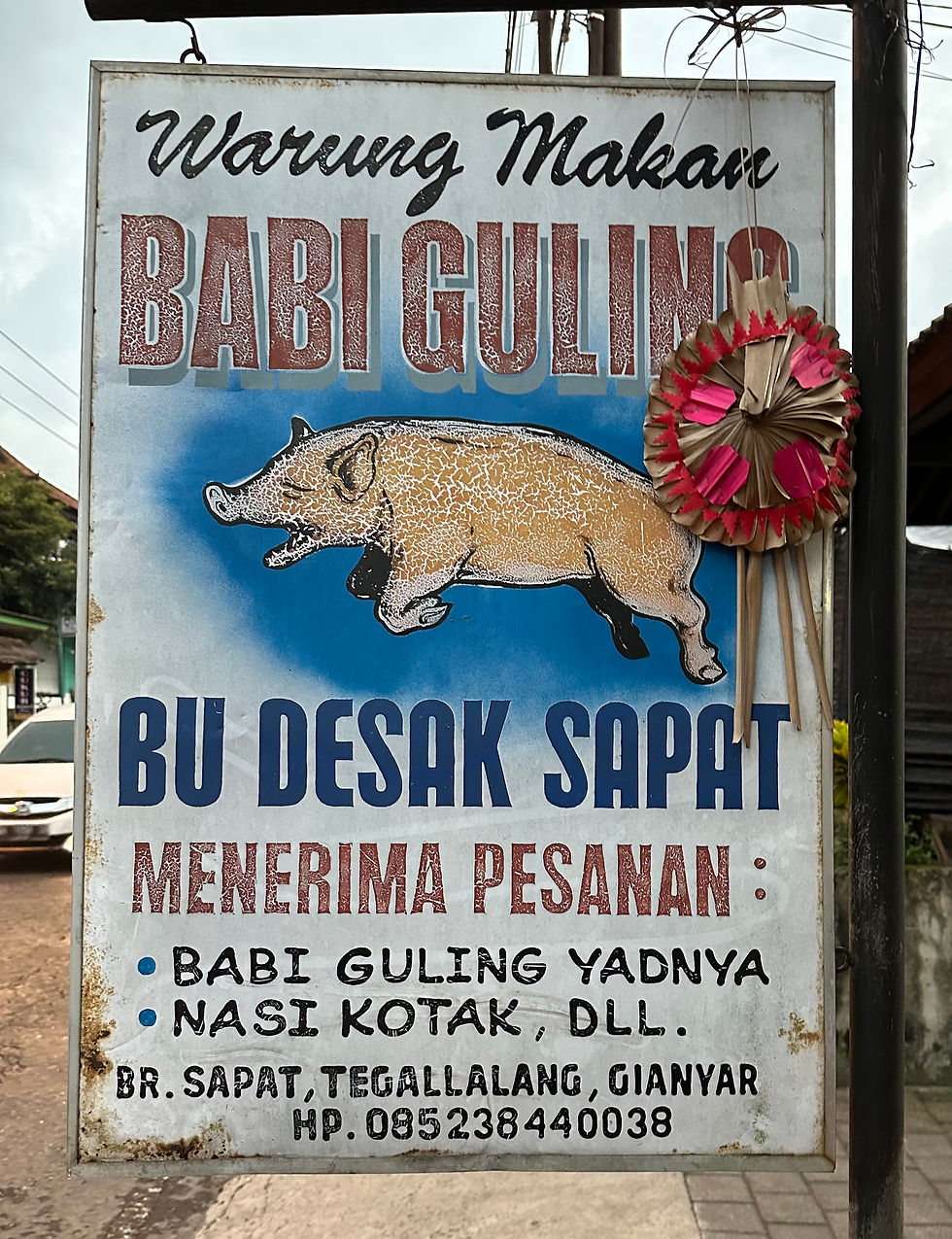
Per the suggestion of our driver, Dewa (Day-wah), we needed to try Balinese suckling pig. With my perfect record of 46 years of never turning down swine, we obviously had to go. We had to go early as they always sell out, so Dewa picked us up from our villa at 6am to take us to get breakfast of suckling pig. I felt a deep sense of pride that our kids didn't even complain at the early departure time as they were also excited for the opportunity to try delicious, slow roasted pork.
I was surprised as we drove through the town of Ubud. The town was already bustling with activity, even that early in the morning. The market was busy with people buying groceries for the day, along with flowers to make their daily blessing baskets for outside their homes and/or places of business. The little 4"x4" blessing baskets are made daily to show thanks for family, health and all other life blessings. Dewa told me people are truly thankful for those blessing and don't need anything else. Money is not important when you have those kinds of blessings in your life. Pretty awesome perspective. Ubud is primarily Hindu, Kuta beach was mostly Muslim, and many of the other smaller islands are Catholic.
Dewa explained that the market opens at 4am because traditionally the wives would need to buy groceries and flowers before sunrise to get everything prepared for the day as many men would need to be out in the rice fields very early for work. Grayson, Poppy, Kerai, and Enzo were shocked as we drove by the local high school at about 6:10am and kids were already lined up outside on the basketball court getting ready for PE.
We arrived at what looked like a small storefront with a whole golden brown pig sitting on the counter. It was not even 6:30am and they were already on their second pig. Everyone was so friendly in Bali. Combine that with Dewa's ability to strike up conversation with anyone he comes across, and before we knew it, Dewa is leading us through the back of the traditional Balinese house (behind the storefront), through the outdoor kitchen and into what I would consider this family's back yard.
When people refer to a traditional Balinese house, it seems that they are referring to a bunch of smaller homes that make up the "house". Everything is very decorative and if you didn't know better which I didn't, you would think you were walking through the courtyard of some sort of temple. All the men stay in their childhood homes, including when they get married and have families of their own. Daughters stay in the home until they get married and then move into the home of their husband and his family. Each family has their own space. From the places we saw, this meant something like a 500 square foot house. But there are many of these houses around a courtyard, so families actually have a relative large plot of land but very small living spaces. There can be several generations all living together. In Dewa's case, he lives with his grandparents, parents, uncles, brothers and their respective families.
As Dewa led us through the courtyard, it felt like we were crossing some threshold of going where we shouldn't go. But he asked the woman in the store front, which I began to imagine he basically asked, "Hey, can I walk these Americans through your kitchen?" and she said yes. We passed what I assumed was grandma and one of the aunties in a semi-enclosed kitchen. Grandma was grinding coconut and cooking huge pots of rice over an open fire. The auntie was frying the pig intestines. While a little shocking to see the pig intestines just laying out on the concrete waiting to be cooked, my mind was more occupied with how the grandma can make the rice in that huge pot. In perfect conditions on a stove and a nice pot, I can't make rice correctly without a rice maker.
We made it to the very back beyond the courtyard where there were 2 men cooking the pigs. The spit was 2 concrete pits with an open fire. The men constantly rotate the pigs by hand at around 15rpm as it cooks for 3-4 hours. With their other hand they were fighting the constant battle of fanning the flames to heat things up to squirting water on the fire to cool things down to try and keep the heat consistent. They periodically brush the skin with some sort of oil to get it nice and crispy as well as dousing the pig with watered down Coke. Through Dewa, we were informed that between the 2 pit masters, they cook 5-6 pigs/day. So those guys are manually rotating a pig over the spit for 9-12 hours a day. Those two dudes must know EVERYTHING about each other. Just sitting there next to each other 6 days/week for 9-12 hours rotating those pigs. Those conversations must be wild as there is probably no question or topic that is out of bounds.
A woman came and grabbed us from the store front to let us know our food was ready. We sat outside in the courtyard of the family house. In short, the pig was delicious. While this is literally a situation where it's probably best not to see how the sausage is made, it was a super cool experience. While the eating was fantastic, it was even more interesting to see how this family business and household runs. We got a small glimpse of what the reality of living in Ubud is really like from people's work to their home set up and how all these families live together.
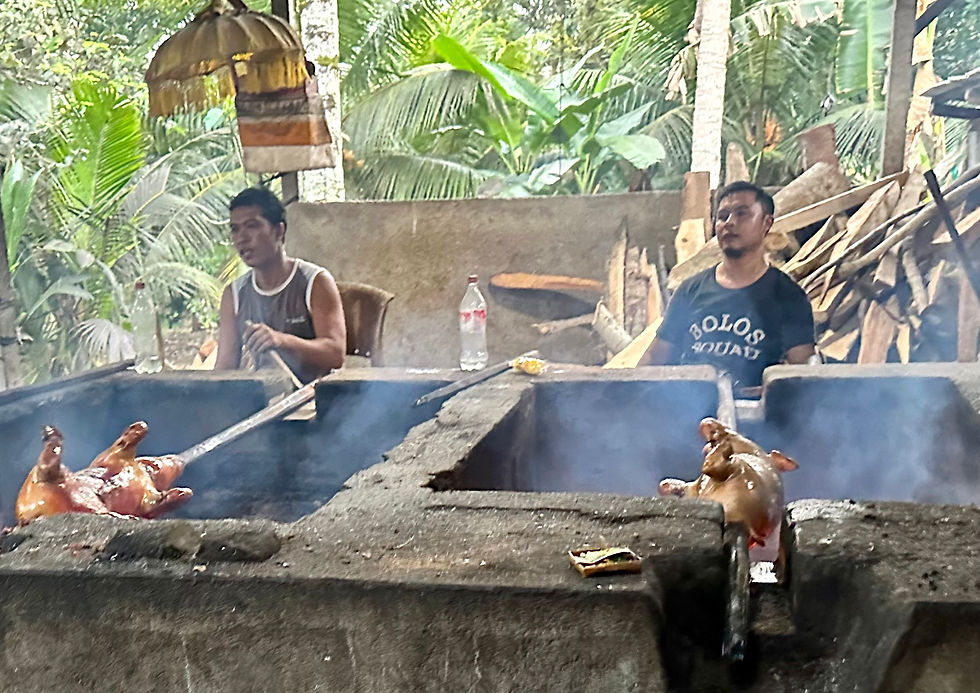
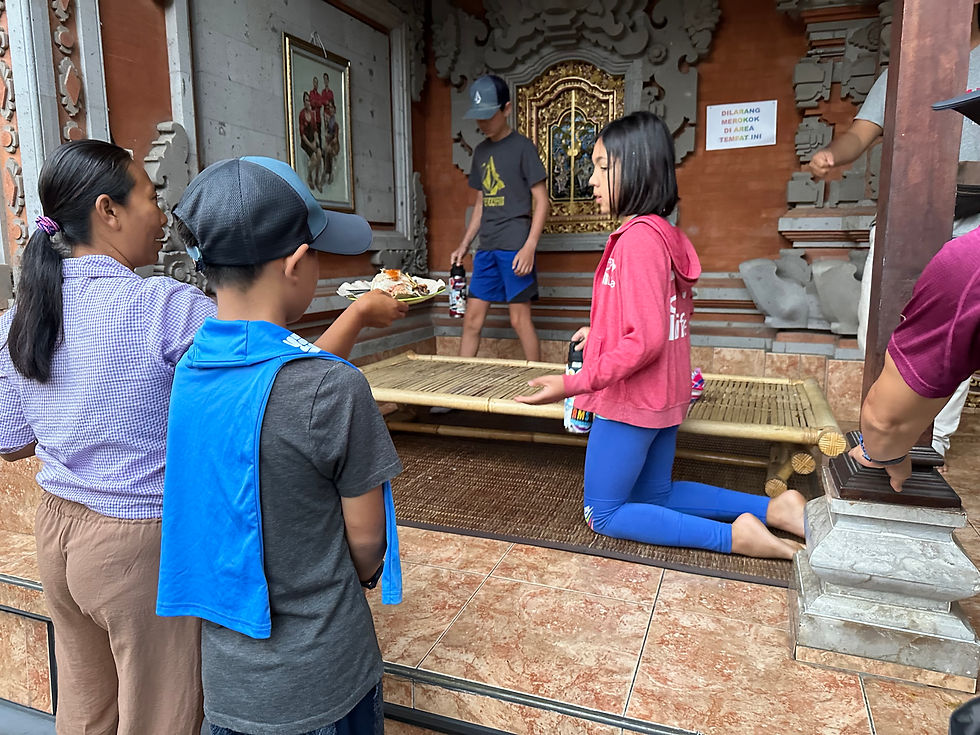

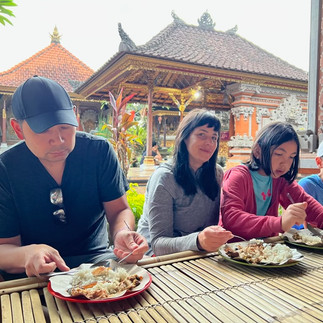



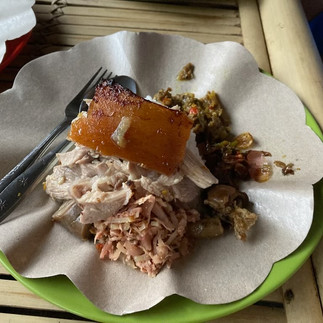



omg that is so cool! if you gave that to me, i would demolish it and you would never see it again!!
-alexa's friend annabelle